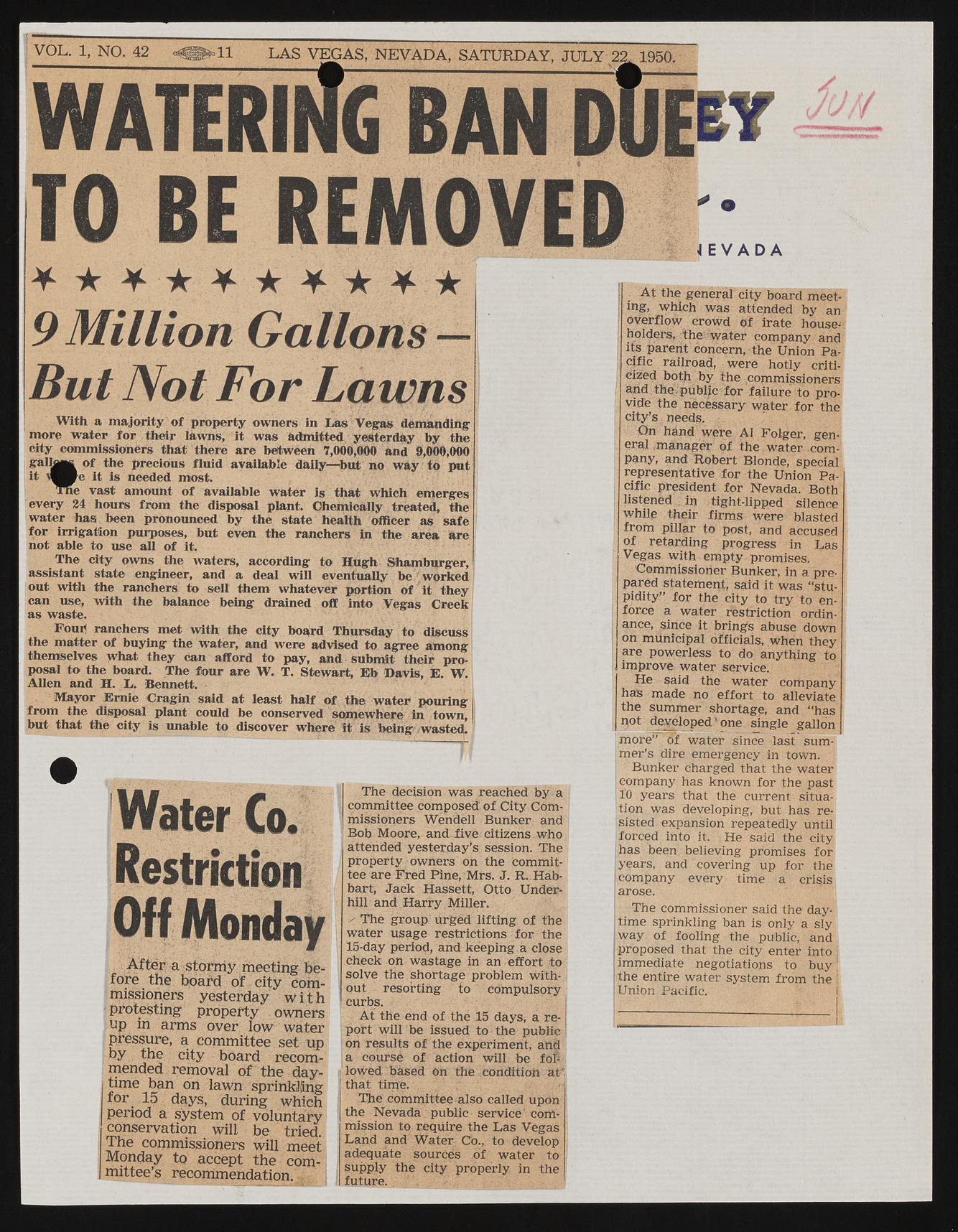Copyright & Fair-use Agreement
UNLV Special Collections provides copies of materials to facilitate private study, scholarship, or research. Material not in the public domain may be used according to fair use of copyrighted materials as defined by copyright law. Please cite us.
Please note that UNLV may not own the copyright to these materials and cannot provide permission to publish or distribute materials when UNLV is not the copyright holder. The user is solely responsible for determining the copyright status of materials and obtaining permission to use material from the copyright holder and for determining whether any permissions relating to any other rights are necessary for the intended use, and for obtaining all required permissions beyond that allowed by fair use.
Read more about our reproduction and use policy.
I agree.Information
Digital ID
Permalink
Details
Member of
More Info
Rights
Digital Provenance
Publisher
Transcription
I VOL. 1, NO. 42 LAS VEGAS, NEVADA, SATURDAY, JULY 22 1950. WATERING BAN DUEby TO BE REMOVED ? * ? * ? * ? * ? * ? 9 Million Gallons — But Not For Lawns With a majority of property owners in Las Vegas demanding more water for their lawns, it was admitted yesterday by the city commissioners that there are between 7,00«i,000 and 9,000,000 gallons of the precious fluid available daily—but no way to put it iflHre it is heeded most. o ie vast amount of available water is that which emerges every 24 hours from the disposal plant. Chemically treated, the water has been pronounced by the state health officer as safe for irrigation purposes, but even the ranchers in the area are not able to use all of it. The city owns the waters, according to Hugh Shamburger, assistant state engineer, and a deal will eventually be • worked out with the ranchers to sell them whatever portion of it they can use, with the balance being drained off into Vegas Creek as waste. Foud ranchers met with; the city board Thursday to discuss the matter of buying the water, and were advised to agree among themselves what they Can afford to pay, and submit their proposal to the board. The four are W . T. Stewart, Eb Davis, E. W. Allen and H. L. Bennett. 'Mayor Ernie Cragin said at least half of the water* pouring I from the disposal plant could be conserved somewhere in town,! but that the city is unable to discover where it is beings wasted. W ater Co. After a stormy meeting b fore the hoax’d of city cot missioners yesterday w it • protesting property owne Up in arms over low wab pressure, a committee set t by the city board recon mended removal of the da: time ban on lawn sprinklir for 15 days, during whic period a system of voluntar conservation will be trie< The commissioners will met Monday to accept the con: mittee’s recommendation. The decision was reached by a committee composed1 of City Commissioners Wendell Bunker and Bob Moore, and five citizens who attended yesterday’s session. The property • owners on the Committee are Fred Pine, Mrs. J. R. Hab-bart, Jack Hassett, Otto Underhill and Harry Miller. K The group urged lifting of the water usage restrictions for the 15-day period, and keeping a close Check on wastage in an effort to solve the shortage problem without resorting to compulsory curbs. At the end of the 15 days, a re- • port will be issued to the public Op results of the experiment, and a course of action will be f o i levied based On the condition at*, that tirn'e. ; 'The; committee also called upon the Nevada public service’ commission to require the Las Vegas Land and Water Co., to develop adequate sources o f water to supply the city properly in the future. ? V | ; At the general city board meet-mg, which was attended by an overflow crowd of irate house- ; holders, the water company and its parent concern, the Union Pacific railroad, were hotly criticized both by the .commissioners . and the>publjc for failure to pro-ride the necessary water for the ; city’s, needs, , Dn hand were A1 Folger, general manager of the water com-i pany, and Robert Blonde, special representative for the Union Pacific president for Nevada. Both listened in tight-lipped silence j whilp their firm s were blasted from pillar to post, and accused of retarding progress in Las Vegas with empty promises. Commissioner Bunker, in a prepared statement, said it was “stupidity” for the city to try to en- ! force a water restriction ordin- I ance, since it brings abuse down i on municipal officials, when they ; are powerless to do anything to improve water service. He said the water company has made no effort to alleviate the summer | shortage, and “has ; Ilot developed * one single gallon more” of water since last Summer’s dire emergency in town. Bunker charged that the Water company has known for the past 1‘0 years that the current situation was developing, but has resisted expansion repeatedly until (forced into it. He said the city (has been believing promises for years, and covering up for the I company every time a crisis | arose. The commissioner said the day- |tirne sprinkling ban is only a sly way of fooling the public, and ! proposed that the city enter into j j immediate negotiations to b u y ; the entire water system from the ! | Union Pacific.

